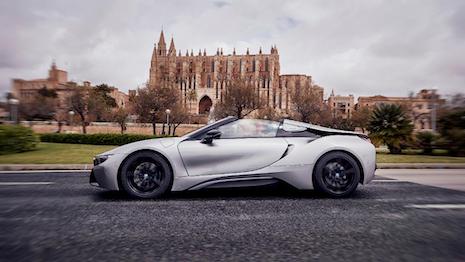 The new BMW i8 Roadster. Image credit: BMW
The new BMW i8 Roadster. Image credit: BMW
A new study has found that relatively wealthier households spend more on high-status cars, especially in counties with more income inequality.
The research from the University of Southern California’s Marshall School of Business suggests that this may be because richer households are signaling their elevated social status to their neighbors through consumption of cars – a visible status good – and could lead to a keeping-up-with-the-Joneses effect for less wealthy community members.
“It boils down to showing to your neighbors and friends that you are doing well,” said Rodney Ramcharan, associate professor of finance and business economics at the USC Marshall School of Business and the study’s author. “This paves the way for more social connections and probably has psychological benefits – I want people to see me for the success that I am.”
The findings, however, run counter to media reports suggesting that wealthy households are spending less on luxury goods and how that signals a nearing recession.
The study also plays into ongoing political conversations about income inequality. The results suggest that rising inequality might have broader macroeconomic consequences, including a reduced savings rate and greater household debt.
 Rodney Ramcharan is associate professor of finance and business economics at the USC Marshall School of Business
Rodney Ramcharan is associate professor of finance and business economics at the USC Marshall School of Business
Here is a Q&A with Mr. Ramcharan on the study's findings and its implications for luxury marketers and retailers:
What was the chief finding of your study?
Richer people in a neighborhood buy fancier high-status cars and other luxury goods, use more credit and are more likely to become bankrupt, as a result.
Were you surprised by the results?
Note, this is not about rich people. Take two people with the same income, and move one to a neighborhood with poorer people, and this now relatively richer person buys more visible luxury goods to signal their higher status to their poorer neighbors.
Take that same person to a neighborhood where everyone has similar income, and the incentives to signal go away.
So is still boils down to one-upmanship?
No, it boils down to showing to your neighbors and friends that you are doing well.
This paves the way for more social connections and probably has psychological benefits – I want people to see me for the success that I am.
What does this mean for marketers and retailers selling luxury goods and services in terms of appealing to this market?
Facebook and social media will boost sales of luxury goods as the society gets more unequal.
Position your goods on social media so that they appear high status and aspirational.
People will buy the goods to post pictures and signal to their friends that they belong or are doing well.
What motivates wealthy people to spend, per your study?
Signaling status – the same reason they give to charities.
How do wealthy individuals and households make spending decisions over the holidays and beyond?
Some of it is experience – trips et cetera – so they can post pictures and signal status. Very little is need.
What do they spend on?
Fancy cars and luxury trips and status clothing
What is the societal impact of this spending?
Wasteful signaling, so unfortunately this is probably a waste for our society.
How did you field the study and with what sample and over what period?
The study is based on U.S. data from 2000-2015.
Your advice to luxury marketers seeking to sway consumers' buying decisions this next holiday season?
Stand for something aspirational and people will buy it to belong.